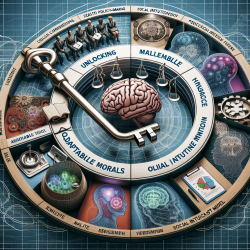Understanding Malleable Morality in Health Policymaking
In the realm of health policymaking, moral experts are often relied upon to navigate complex ethical dilemmas. However, recent research, such as the article "Malleable Morality: Re-Shaping Moral Judgments in Health Policymaking," challenges the assumption that these experts' judgments are purely products of deliberate reasoning. Instead, it suggests that moral intuitions, shaped by social settings, play a significant role in their decision-making processes.
The Role of Moral Intuitions
According to the Social Intuitionist Model (SIM) developed by social psychologist Jonathan Haidt, moral reasoning often follows spontaneous moral intuitions. These intuitions are influenced by emotions and social contexts, meaning that moral judgments are not solely based on rational deliberation. This insight implies that even moral experts may subconsciously rely on personal intuitions, which can be subjective and shaped by their social environment.
Implications for Practitioners
For practitioners in the field of health policymaking, understanding the role of moral intuitions is crucial. It highlights the importance of engaging with diverse perspectives and stakeholders to ensure that moral judgments are well-rounded and reflective of broader societal values. By fostering open dialogue and public participation, practitioners can challenge their own intuitions and develop more nuanced moral judgments.
Encouraging Further Research
The findings from the article encourage practitioners to delve deeper into the interplay between moral intuitions and reasoning. By conducting further research, they can explore how social contexts and diverse viewpoints influence moral judgments. This knowledge can inform the development of more democratic and inclusive health policies that better serve the public interest.
Conclusion
Ultimately, the research on malleable morality underscores the need for practitioners to be mindful of the intuitive nature of moral judgments. By embracing public engagement and considering diverse perspectives, they can enhance the rationality and legitimacy of health policymaking. To read the original research paper, please follow this link: Malleable Morality: Re-Shaping Moral Judgments in Health Policymaking.










